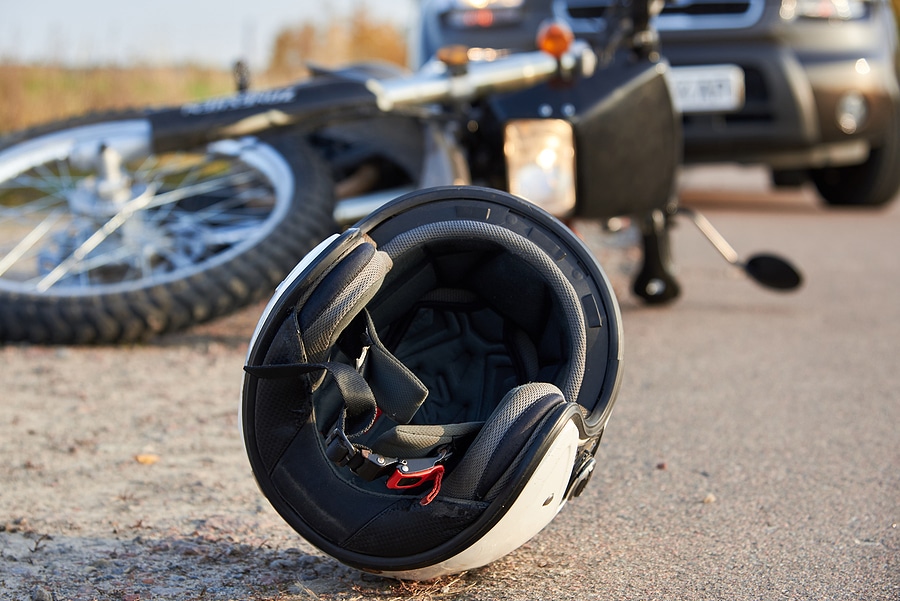How many motorcycle accident are fatal? Were you in a motorcycle accident lately? Despite the convenience of using a motorcycle, motorcyclists are vulnerable to fatalities during accidents, especially when motorists or truckers are involved.
Not all motorcycle accidents are fatal. However, if the damages and injuries you sustain from a motorcycle accident have set you back financially, physically, or emotionally, you should consider hiring a motorcycle accident lawyer to help you file a strong compensation claim.
At Nicolet Law Office, we provide experience-backed legal representation and advice for accident victims in Wisconsin and Minnesota. Here are the latest statistics and guide to motorcycle accident fatalities. Reach out to a motorcycle accident lawyer.
Motorcycle Accident Statistics
Below are statistics and trends depicting the state of motorcycle accidents in the U.S.
- Over 5,000 motorcyclists lose their lives annually in the US due to road accidents. In 2020 alone, 5,575 motorcyclists died from road accidents.
- Motorcyclists are more likely to be involved in a car accident than car users.
- Most fatal motorcycle road accidents happen in broad daylight
- Speed isn’t the most common cause of fatal motorcycle accidents. 1 in 3 fatal motorcycle accidents result from speeding. However, while it isn’t the most common cause of fatal motorcycle accidents, speeding is a concern that endangers all road users.
- Motorcycle helmets and rider safety reduce head injuries and fatality rates as a result of motorcycle accidents. They help prevent fatal injuries in 37 percent of motorcycle accidents.
- According to the National Highway Traffic Safety Administration (NHTSA), 60 percent of fatal motorcycle accidents occur in urban areas, whereas 40 percent occur in rural areas. Different factors can contribute to the increased rate of motorcycle crash fatalities in urban areas, such as increased traffic, poor road conditions prevalent in most urban areas, etc.
- 35 percent of motorcycle crashes happen at intersections, with speed being a contributing factor. Surprisingly, fatal motorcycle accidents also happen on roads without intersections, as motorists and motorcyclists see no need to go slow. According to another NHTSA study on motorcycle crash fatalities, most accidents involving fatalities and injuries (over 41,000 accidents) were front crashes. Such accidents primarily involved hitting other road users head-on, which is more likely to happen in stretches without intersections.
- 91 percent of fatal motorcycle crashes happen on non-interstate roads.
- Most fatal accidents tend to occur in states with warmer climates. During warmer months and increased temperatures, tourists and locals prefer to use motorcycles, naturally increasing the risks of accident fatalities. The top states in this category include Mississippi, Texas, South Carolina, and Florida.
- The average age of motorcycle fatalities is 40. Possible reasons for this statistic include reduced vision, body strength, and hearing typical in aging individuals. Another possible explanation could be reduced balance or slower reflexes.
- Alcohol is one of the main contributing factors in 50 percent of fatal crashes in four northern states (Wyoming, Rhode Island, Montana, and Alaska).
- Mississippi, Texas, and Arkansas have the highest motorcycle fatality rates.
While there is no single number to describe how fatal motorcycle accidents can be, motorcycle accidents are still a concern and can cause massive injuries and damages. Fortunately, with the help of an experienced motorcycle accident attorney, victims can seek proper compensation.
Common Causes of Motorcycle Accident Fatalities
Common causes of motorcycle accidents and resulting fatalities include:
- Speeding: Speeding and reckless driving are common causes of motorcycle fatalities. Combined with factors such as poor road conditions, driving while intoxicated, or poor bike conditions, speeding can result in a fatal motorcycle accident.
- Left turns: Most accidents occur when motorcycles or other road users make a left turn.
- Poor road conditions, such as uneven pavements, slippery surfaces, loose gravel, etc., can reduce a motorcycle’s balance and increase the risk of a fatal road accident.
- Alcohol and drug use: Alcohol and drugs impair judgment in motorists and road users, increasing the risks of fatal road accidents.
Can You Prevent Motorcycle Accidents and Fatalities?
Motorcyclists and other road users can prevent fatal road crashes. Wearing protective gear like helmets is highly recommended to reduce the impact of fatalities.
Other ways you can prevent motorcycle accident fatalities include:
- Wearing visible clothing or gear when using motorcycles. Wearing bright clothing or clothing with reflective surfaces, especially in low-light situations and dimly-lit highways, can increase visibility for other road users, reducing the risk of a fatal crash.
- Ensure your bike is ready for use. Always assess the state of your motorcycle before usage to reduce fatal crashes typically caused by bike defects like dysfunctional brakes, etc. Proper bike maintenance can help you avoid a fatality.
- Safe and obedient road usage. Strive at all times to ride carefully and obey all traffic rules. Chances are, by following traffic rules, you can transfer all the liability to the at-fault road user in case of a motorcycle accident.
Unfortunately, despite following all traffic rules, wearing safety gear, and proper bike maintenance, motorcyclists are still at increased risk of motorcycle accidents caused by cars and trucks.
Motorcycle Accident Injuries and Fatalities

Many motorcycle accident injuries can be fatal. However, the injuries you sustain and the compensation you deserve typically vary depending on how you are hit, your speed, your safety measures, and the size of the truck/ vehicle that hit you.
Fatal injuries can develop either immediately or gradually due to unseen complications.
Fatal injuries typical in a motorcycle accident may include:
- Traumatic brain injury: According to an NHTSA-conducted study on 104,472 motorcyclists injured in road crashes, 15 percent of motorcyclists with helmets and 21 percent of motorcyclists without helmets suffered a traumatic brain injury.
- Spinal cord injury: Spinal cord injury resulting from the collision impact can result in paralysis (paraplegia or quadriplegia). Such catastrophic injury can result in permanent disability.
- Lower extremity injuries: Leg and knee injuries can be fatal and lead to permanent disability.
- Internal injuries: Blunt-force or penetrating trauma, typical in motorcycle accidents, can result in internal organ damage and internal bleeding.
- Road rash: Road rash is a serious skin abrasion that occurs when riders make contact with road surfaces during a crash. The severity of road rash can range from mild to severe, exposing victims to serious infections and permanent scarring.
- Exhaust and chemical burns.
- Cuts and lacerations that increase the risks of infections.
- Death.
The severity of motorcycle accident injuries can be reflected in your medical bills ranging from high to low. As such, it is important to have a personal injury lawyer to help you claim maximum compensation to cover the full range of your motorcycle accident injuries.
What Damage Can I Recover After a Fatal Motorcycle Accident?
You can claim compensatory and punitive damages after a fatal motorcycle accident if they apply. Compensatory damages can be economic or non-economic.
Economic Damages
Economic damages are tangible and mostly account for measurable costs and expenses after a motorcycle accident.
If you or your loved one died in a motorcycle crash, you can file to recover:
- Past, current, and future medical bills incurred for treating the injuries sustained in a motorcycle crash.
- Lost wages and future earnings, especially if the accident has incapacitated you and your ability to work again.
- Repair, replacement, and compensation for destroyed property.
Non-economic Damages
Non-economic damages are intangible and ideally intended to address a road accident’s mental, emotional, and psychological effects. The impact of a motorcycle crash can cause grave pain and suffering.
Non-economic damages include:
- Loss of consortium or companionship
- Emotional distress
- Pain and suffering
- Loss of enjoyment of life.
While the compensation you receive may not reverse the effects of a fatal motorcycle crash, it can help you or loved ones get back on their feet.
Can I File for a Wrongful Death in a Motorcycle Accident Claim?
If you represent the deceased’s estate, you can file for wrongful death in a motorcycle crash caused by another party.
Death resulting from an accident can cause a major setback for the survivors. An experienced personal injury lawyer can help you pursue the compensation you need and determine who is liable for the accident.
To prove liability, an attorney must show that the at-fault party was negligent.
Negligence requires four elements:
- The at-fault party had a duty of care (i.e. driving safely)
- The at-fault party breached that duty
- The breach caused an accident or injury to a victim
- The victim accrued damages as a result of the accident or injury
Actions that may qualify as a breach of duty while driving include:
- Failure to yield to oncoming road users
- Speeding or reckless driving
- Driver fell asleep while driving
- Distracted driving
- Driving while intoxicated.
A lawyer can try to prove negligence by first gathering evidence.
Ways your lawyer can gather evidence to support your wrongful death claim include:
- Interviewing witnesses
- Taking photo and video evidence
- Going over police and medical reports
- Speaking with experts who may be willing to testify
- Visiting and reconstructing the accident scene.
In some cases, the negligent party can be someone other than the assumed at-fault drivers. For instance a motorcycle accident may be caused by a defective bike or accompanying parts.
If a defective motorcycle part resulted in the death of a motorcycle user, the bike or parts manufacturer might be to blame. An experienced motorcycle accident attorney can help you file a strong product liability case and recover damages or you.
What Is the Statute of Limitations for Filing a Motorcycle Accident Claim?

The statute of limitations restricts how long you have to file a claim from the date of your motorcycle accident. This time limit varies from state to state and often differs based on the type of action you are filing (personal injury versus wrongful death). A motorcycle accident attorney can help determine how much time you have to file and ensure you do so on time.
How Can a Lawyer Help You After a Fatal Motorcycle Accident?
Here is how an attorney can help you after a motorcycle crash.
1). Protect Your Legal Rights
Insurance companies will attempt to shift blame to you despite you being the victim. An experienced accident attorney knows these tactics insurers use to undermine your claim.
Common mistakes to avoid after a motorcycle accident when talking to insurance companies include:
- Apologizing. Insurance adjusters can twist your apology into an admission of guilt or responsibility.
- Being dishonest or exaggerating your statement.
- Providing a statement to the at-fault driver’s insurance company.
- Settling too quickly.
- Not hiring a lawyer.
A lawyer understands the unseen traps by insurance companies and strives to fight to protect your legal rights to compensation.
2). Establish Your Claim Validity
Proving liability in a motorcycle crash can be challenging. An experienced motorcycle accident attorney knows what to look for to determine liability and establish your claim’s validity.
3). Negotiate Proper Settlement
A proper settlement should cover all your medical expenses, property damages, and non-economic damages. However, insurance companies will try to devalue your claim by attempting to shift blame or denying its existence.
An experienced personal injury lawyer can negotiate the best settlement possible to cover all your damages. The lawyer investigates your claim, establishes its value, and represents your interests in dealing with insurers.
More importantly, hiring a lawyer allows you sufficient time to recover while the lawyer handles the legal aspects, including representing you in court and during settlement negotiations.
What Should You Do After a Motorcycle Accident?
Below are steps to take after a motorcycle accident:
- Move away from the flow of traffic. Ensure you or other road users are not in any danger. More importantly, keep your gear on and resist the temptation to remove your helmet.
- Call law enforcement and first responders to assess and address the situation. You can also call your lawyer at this stage.
- Collect information about the other party involved in the accident
- Collect information from any witnesses and other road users
- Seek medical attention.
The sooner you call a motorcycle accident lawyer, the easier you can deal with all parties, especially the insurance companies involved.
Finding the Right Motorcycle Accident Lawyer

The period after a motorcycle crash can be confusing and overwhelming. Hiring an experienced lawyer can protect your rights and interests during these challenging times.
Having an experienced motorcycle lawyer by your side is important to help you recover maximum compensation.
Contact an experienced personal injury attorney to learn more about your rights and how to pursue the compensation you deserve.
